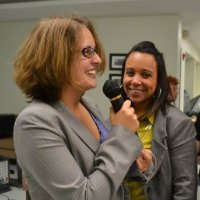You have to hand it to NARAL Pro-Choice Massachusetts: they know their target audience. On Tuesday, April 29, the pro-choice advocacy group is holding its beloved annual Chocolate Madness fundraiser at the Cyclorama. I chatted with NARAL’s political and organizing director, Celia Segel, about the event, the state of women’s health, and if working for Sen. Al Franken was as fun as it would seem. Click here for more information about the chefs and breweries participating in the event.
Tell me about Chocolate Madness. It’s such a great idea for a fundraiser! How did you come up with it and how long have you been doing it?

Chocolate Madness was started 31 years ago by a few dedicated activists that are still involved in planning the event. It started off in a small art gallery with just a few vendors donating chocolate and has grown into a massive event with 600 attendees and over 30 vendors. It used to be completely volunteer-driven, but about 10 years ago it got so big that we had to move to the Cyclorama and have a staff person become involved in the process.
We are really excited for this year’s event—we’re going to have a pro-choice photo booth with props; beer, spirits and wine tastings, passed appetizers and a keynote speaker that we will be announcing next Tuesday at noon via social media.
Roe v. Wade was 40 years ago. What are the threats to women’s health you are working on today?
The threats to women’s health in Massachusetts are different than they are in the rest of the country. We still see the same bills filed here that they are passing in Mississippi and North Dakota—mandatory waiting periods and counseling requirements, procedure bans, etc.—and we do everything to make sure those bills don’t go anywhere.
Massachusetts is in a unique place in the country. We have a pro-choice governor and a pro-choice State House—but we only have a 10-vote majority in the House of Representatives. During the 2014 elections, we could lose all of those seats, or we could strengthen our majority. It depends how much Massachusetts voters are paying attention.
Massachusetts has the potential to really be a national leader on reproductive health access, just as we have been a national leader on equal marriage and health care access. Yet we are being surpassed by states like New York, California, Washington, Oregon and Maryland, which are passing strong pro-choice policies every year. Our last pro-choice policy was signed by the governor in 2007. Despite the fact that we have a pro-choice governor and State House, we haven’t necessarily seen leadership on a pro-choice agenda and we can do better.
Just last week there was a Supreme Court decision about money and politics. As a political organizer, how does that affect your job, and what side do you think it will ultimately benefit?
In a lot of my work on a local level, there are actually pretty strict limits for state representative and state senate races. Local candidates need a base line of funding, but really they need to be out knocking on doors, at community events and making phone calls in their district. So my hope in that aspect of my job won’t change much.
For statewide and congressional elections, it’s entirely different. It means that candidates have to spend more of their time making fundraising calls instead of out in the field earning votes. As a political organizer, the less we engage with candidates in the field, the less accountability there is to promises made on the campaign trail. The candidates don’t like it either, because it keeps them away from voters. In Massachusetts last year, we saw Elizabeth Warren and Scott Brown do something about it in their “People’s Pledge.” Sometimes it isn’t always in the best interest of the campaigns, as we saw in the Boston mayoral campaign, where Mayor Walsh had all the outside spending from the unions, which was able to show his strength.
From what I understand, many pundits are saying that we likely won’t see the impacts of this decision in 2014, and that we will really begin to see the impacts during the big national races in 2016.
I saw that earlier in your career you worked for Sen. Al Franken. Was that as hysterical and fun as I’m imagining it to be?
I worked for Sen. Franken for one year, from 2009-10. It was a very exciting time to be in Washington, D.C., because it was a year when things were actually getting done. I was there when they passed the Affordable Care Act and the Dodd-Frank Act. I worked with a brilliant, hardworking staff that found ways, even while working for the most freshman senator, to pass major laws with national impact. For example, the 2010 health reform law included a provision authored by Sen. Franken known as Medical Loss Ratio—or the 80/20 rule—that requires insurance companies to spend at least 80 percent of premiums on actual health care, not on administrative costs, marketing, CEO salaries or profits. It was a very smart way to make a big difference in that law.
While he brought humor into his work, he also was incredibly serious about his job. He used his humor to build unlikely relationships across the aisle, with people like Rand Paul. One of my favorite parts of the job was all of the celebrities who came through the door. I spent two hours giving Garrison Keillor a tour of the Capitol—just me and him. Richard Schiff, who played Toby on “The West Wing,” would often drop by our office. While I loved being in D.C. and loved working for the senator, it also made me realize that I wanted to move home and work in my home community in Boston.

This post has been contributed by a third party. The opinions, facts and any media content are presented solely by the author, and JewishBoston assumes no responsibility for them. Want to add your voice to the conversation? Publish your own post here. MORE


